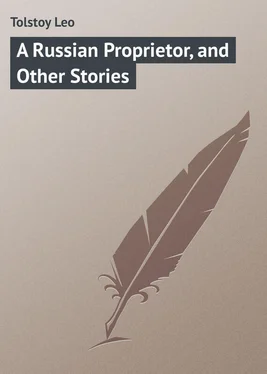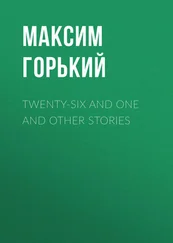Leo Tolstoy - A Russian Proprietor, and Other Stories
Здесь есть возможность читать онлайн «Leo Tolstoy - A Russian Proprietor, and Other Stories» — ознакомительный отрывок электронной книги совершенно бесплатно, а после прочтения отрывка купить полную версию. В некоторых случаях можно слушать аудио, скачать через торрент в формате fb2 и присутствует краткое содержание. Жанр: Русская классическая проза, на английском языке. Описание произведения, (предисловие) а так же отзывы посетителей доступны на портале библиотеки ЛибКат.
- Название:A Russian Proprietor, and Other Stories
- Автор:
- Жанр:
- Год:неизвестен
- ISBN:нет данных
- Рейтинг книги:4 / 5. Голосов: 1
-
Избранное:Добавить в избранное
- Отзывы:
-
Ваша оценка:
- 80
- 1
- 2
- 3
- 4
- 5
A Russian Proprietor, and Other Stories: краткое содержание, описание и аннотация
Предлагаем к чтению аннотацию, описание, краткое содержание или предисловие (зависит от того, что написал сам автор книги «A Russian Proprietor, and Other Stories»). Если вы не нашли необходимую информацию о книге — напишите в комментариях, мы постараемся отыскать её.
A Russian Proprietor, and Other Stories — читать онлайн ознакомительный отрывок
Ниже представлен текст книги, разбитый по страницам. Система сохранения места последней прочитанной страницы, позволяет с удобством читать онлайн бесплатно книгу «A Russian Proprietor, and Other Stories», без необходимости каждый раз заново искать на чём Вы остановились. Поставьте закладку, и сможете в любой момент перейти на страницу, на которой закончили чтение.
Интервал:
Закладка:
"He will go on, and go on rapidly, in that path," thought Nekhliudof of his friend; "but I"…
But by this time he was already mounting the steps to his house; and near it were standing a score of peasants and house-servants, waiting with various requests to the prince. And this brought him back from dreams to the reality.
Among the crowd was a ragged and blood-stained peasant-woman, who was lamenting and complaining of her father-in-law, who had been beating her. There were two brothers, who for two years past had been going on shares in their domestic arrangements, and now looked at each other with hatred and despair. There was also an unshaven, gray-haired domestic serf, with hands trembling from the effects of intoxication; and this man was brought to the prince by his son, a gardener, who complained of his disorderly conduct. There was a peasant, who had driven his wife out of the house because she had not worked any all the spring. There was also the wife, a sick woman, who sobbed, but said nothing, as she sat on the grass by the steps, – only showed her inflamed and swollen leg, carelessly wrapped up in a filthy rag.
Nekhliudof listened to all the petitions and complaints; and after he had given advice to one, blamed others, and replied to still others, he began to feel a sort of whimsical sensation of weariness, shame, weakness, and regret. And he went to his room.
XX
In the small room occupied by Nekhliudof stood an old leather sofa decorated with copper nails, a few chairs of the same description, an old-fashioned inlaid extension-table with scallops and brass mountings, and strewn with papers, and an old-fashioned English grand with narrow keys, broken and twisted.
Between the windows hung a large mirror with an old carved frame gilded. On the floor, near the table, lay packages of papers, books, and accounts.
This room, on the whole, had a characterless and disorderly appearance; and this lively disorder presented a sharp contrast with the affectedly aristocratic arrangement of the other rooms of the great mansion.
When Nekhliudof reached his room, he flung his hat angrily on the table, and sat down in a chair which stood near the piano, crossed his legs, and shook his head.
"Will you have lunch, your excellency?" asked a tall, thin, wrinkled old woman, who entered just at this instant, dressed in a cap, a great kerchief, and a print dress.
Nekhliudof looked at her for a moment or two in silence, as though collecting his thoughts.
"No: I don't wish any thing, nurse," said he, and again fell into thought.
The nurse shook her head at him in some vexation, and sighed.
"Eh! Father, Dmitri Nikolayévitch, are you melancholy? Such tribulation comes, but it will pass away. God knows"…
"I am not melancholy. What have you brought, Malanya Finogenovna?" replied Nekhliudof, endeavoring to smile.
"Ain't melancholy! can't I see?" the old woman began to say with warmth. "The whole livelong day to be all sole alone! And you take every thing to heart so, and look out for every thing; and besides, you scarcely eat any thing. What's the reason of it? If you'd only go to the city, or visit your neighbors, as others do! You are young, and the idea of bothering over things so! Pardon me, little father, I will sit down," pursued the old nurse, taking a seat near the door. "You see, we have got into such a habit that we lose fear. Is that the way gentlemen do? There's no good in it. You are only ruining yourself, and the people are spoiled. That's just like our people: they don't understand it, that's a fact. You had better go to your auntie. What she wrote was good sense," said the old nurse, admonishing him.
Nekhliudof kept growing more and more dejected. His right hand, resting on his knee, lazily struck the piano, making a chord, a second, a third.
Nekhliudof moved nearer, drew his other hand from his pocket, and began to play. The chords which he made were sometimes not premeditated, were occasionally not even according to rule, often remarkable for absurdity, and showed that he was lacking in musical talent; but the exercise gave him a certain indefinable melancholy enjoyment.
At every modification in the harmony, he waited with muffled heart-beat for what would come out of it; and when any thing came, he, in a dark sort of way, completed with his imagination what was missing.
It seemed to him that he heard a hundred melodies, and a chorus, and an orchestra simultaneously joining in with his harmony. But his chief pleasure was in the powerful activity of his imagination; confused and broken, but bringing up with striking clearness before him the most varied, mixed, and absurd images and pictures from the past and the future.
Now it presents the puffy figure of Davidka Byélui, timidly blinking his white eyelashes at the sight of his mother's black fist with its net-work of veins; his bent back, and huge hands covered with white hairs, exhibiting a uniform patience and submission to fate, sufficient to overcome torture and deprivation.
Then he saw the brisk, presuming nurse, and, somehow, seemed to picture her going through the villages, and announcing to the peasants that they ought to hide their money from the proprietors; and he unconsciously said to himself, "Yes, it is necessary to hide money from the proprietors."
Then suddenly there came up before him the fair head of his future wife, for some reason weeping and leaning on his shoulder in deep grief.
Then he seemed to see Churis's kindly blue eyes looking affectionately at his pot-bellied little son. Yes, he saw in him a helper and savior, apart from his son. "That is love," he whispered.
Then he remembered Yukhvanka's mother, remembered the expression of patience and conciliation which, notwithstanding her prominent teeth and her irregular features, he recognized on her aged face.
"It must be that I have been the first during her seventy years of life, to recognize her good qualities," he said to himself, and whispered "Strange;" but he continued still to drum on the piano, and to listen to the sounds.
Then he vividly recalled his retreat from the bees, and the expressions on the faces of Karp and Ignát, who evidently wanted to laugh though they made believe not look at him. He reddened, and involuntarily glanced at the old nurse, who still remained sitting by the door, looking at him with silent attention, occasionally shaking her gray head.
Here, suddenly, he seemed to see a troïka of sleek horses, and Ilyushka's handsome, robust form, with bright curls, gayly shining, narrow blue eyes, fresh complexion, and delicate down just beginning to appear on lip and chin.
He remembered how Ilyushka was afraid that he would not be permitted to go teaming, and how eagerly he argued in favor of the work that he liked so well. And he saw the gray early morning, that began with mist, and the smooth paved road, and the long lines of three-horse wagons, heavily laden and protected by mats, and marked with big black letters. The stout, contented, well-fed horses, thundering along with their bells, arching their backs, and tugging on the traces, pulled in unison up the hill, forcefully straining on their long-nailed shoes over the smooth road.
As the train of wagons reached the foot of the hill, the postman had quickly dashed by with jingling bells, which were echoed far and wide by the great forest extending along on both sides of the road.
" A-a-aï! " in a loud, boyish voice, shouts the head driver, who has a badge on his lambskin cap, and swings his whip around his head.
Beside the front wheel of the front team, the redheaded, cross-looking Karp is walking heavily in huge boots. In the second team Ilyushka shows his handsome head, as he sits on the driver's seat playing the bugle. Three troïka-wagons loaded with boxes, with creaking wheels, with the sound of bells and shouts, file by. Ilyushka once more hides his handsome face under the matting, and falls off to sleep.
Читать дальшеИнтервал:
Закладка:
Похожие книги на «A Russian Proprietor, and Other Stories»
Представляем Вашему вниманию похожие книги на «A Russian Proprietor, and Other Stories» списком для выбора. Мы отобрали схожую по названию и смыслу литературу в надежде предоставить читателям больше вариантов отыскать новые, интересные, ещё непрочитанные произведения.
Обсуждение, отзывы о книге «A Russian Proprietor, and Other Stories» и просто собственные мнения читателей. Оставьте ваши комментарии, напишите, что Вы думаете о произведении, его смысле или главных героях. Укажите что конкретно понравилось, а что нет, и почему Вы так считаете.












